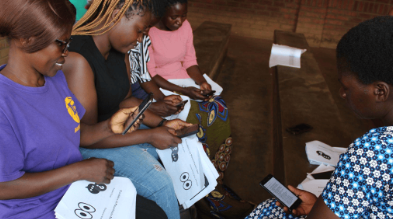Transforming Digital Readability: Advancing Education and Health Equity
 Manoj
Manoj
Being able to effectively engage with and read digital documents is essential in today’s world. Research highlights that subtle differences in text formatting can significantly impact reading speed, comprehension, and accuracy across various age groups and reading levels.
Since 2019, the EdTech Center at World Education has been collaborating with Adobe and The Readability Consortium to enhance digital text readability. This initiative aims to address the challenges encountered by users accessing information via smartphones. Over the past five years, we have field-tested Liquid Mode, a feature in the free Adobe Acrobat Reader that reformats digital text in PDF documents. This innovative tool restructures text presentation, empowering users to control their viewing experience.
Progress in the United States
In the fall of 2020, we began gathering data on the usage of Liquid Mode among practitioners and adult learners. Over two years, we introduced Liquid Mode to 350 adult education teachers and program administrators through professional development events. Our objective was to enhance the readability of PDFs for adult learners whose only access to Wi-Fi and digital content was through smartphones.
Feedback from adult learners indicated that their reading speed, comprehension, and overall comfort improved significantly when they had control over the digital text format. This newfound ease with Liquid Mode allowed learners to download PDFs while connected to Wi-Fi and access them offline, enabling them to read diverse materials anywhere.
Implementation in Malawi
From 2023 to 2024, World Education’s EdTech Center and Bantwana Initiative teams field-tested Liquid Mode in Malawi as part of the USAID-funded Ana Patsogolo Activity, which aims to support children and adolescents living with HIV. Community case workers (CCWs) disseminate essential health information during home visits to caregivers. Prior to our field test, CCWs relied on bulky binders filled with paper documents—known as job aids. We aimed to digitize these resources, enabling CCWs to access them as PDFs on smartphones.
We introduced Liquid Mode to 896 CCWs across eight districts through digital job aids. Initially, we viewed Liquid Mode as a valuable resource for adults with limited internet access. Through our field-testing, we discovered that optimizing reading formats not only increased accessibility but also enhanced privacy.
The adoption of Liquid Mode in this community health context suggests that users can leverage the tool to enhance health service delivery and promote digital and health equity in communities that need it most.
Future Initiatives
World Education’s EdTech Center and Adobe are collaborating to support JSI India’s efforts in Gujarat, developing health media for childcare workers using Adobe Express. Our teams are training childcare workers and local staff to use Adobe Express to create media that complements their existing educational resources.
We are excited to continue our partnership with Adobe, aiming to improve educational and health outcomes while promoting digital equity worldwide.
Subscribe to my newsletter
Read articles from Manoj directly inside your inbox. Subscribe to the newsletter, and don't miss out.
Written by

Manoj
Manoj
I am a developer from HTC